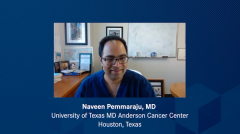
Expanding Novel Treatment Options for Patients With T-Cell ALL
A brief review of T-Cell acute lymphoblastic leukemia and emerging novel therapies that may improve upon its existent treatment armamentarium.
Episodes in this series

Transcript:
Naveen Pemmaraju, MD: Outside of the MPNs [myeloproliferative neoplasms], in the acute leukemia setting, one of the most challenging acute leukemias to treat in the clinic is that of relapsed/refractory T-cell ALL [acute lymphoblastic leukemia]. As a reminder, you have acute myeloid leukemia, or AML, acute lymphoblastic leukemia, or ALL. Then in these acute leukemias, for example, ALL, you can have multiple subtypes. So, in ALL the 2 major subtypes are B-ALL and T-ALL, so, B cell and T cell. In this relapsed/refractory T-cell ALL [T-ALL] setting, the challenge has been that after frontline, cytotoxic, multiagent chemotherapy, there’s a shortage of approved and available, uniformly agreed upon treatments, and so many of these patients need to go for either a clinical trial or some other novel or creative approach.
Now, in the setting of ALL, particularly, T-ALL, a lot of different pathways have been tried and tested, both in the laboratory and in the clinic, epigenetic pathway approaches, and so on and so forth. Since T-ALL is such a challenging entity, many scientists and groups have tried to look at it. One potential approach that has shown some activity, both in the lab and now in the clinic, is that of BCL-XL inhibition. The active oral agent that’s in clinical trials is that of navitoclax. Navitoclax, myself and others have led in the MPN, MF [myelofibrosis] space. The principal concept is that of inhibition of a pathway known as BCL-XL. The related drug venetoclax targets BCL2, which is a well-known protein that’s active in the leukemia space. But BCL-XL, if you will, a cousin or related pathway, also in this anti-apoptotic pathway, appears to be potentially an active target in these tough-to-treat acute leukemias such as T-cell ALL.
Thus, our colleagues and investigators have sought to go from the lab to clinical trial testing. The navitoclax agent is part of a clinical trial program with venetoclax and chemotherapy, specifically for these patients with relapsed/refractory ALL, including T-ALL. We await those mature data over time. Again, it suggests that unique pathways among different groups of chronic and acute leukemias may be active. They may be active in different ways and in different forms, but a pathway that may be active in one leukemia could be active in another one. It’s something we must keep our eye on as we enter into this personalized, targeted therapy era.
Transcript edited for clarity.





































